BULLETIN

‘Demon’ comes from the Greek δαίμων or δαιμόνιον.
Of Demons, Spirits and Other Creatures
Schon raschelt eine hier und wird sogleich mich hören.
Der Herr der Ratten und der Mäuse,
Der Fliegen, Frösche, Wanzen, Läuse
Befiehlt dir, dich hervor zu wagen
Und diese Schwelle zu benagen,
So wie er sie mit Öl betupft-
Da kommst du schon hervorgehupft!”
To conjure up a lengthier spell,
One’s rustling here that will do well.
The Lord of Rats and Mice,
Of Flies, Frogs, Bugs and Lice,
Summons you to venture here,
And gnaw the threshold where
He stains it with a little oil –
You’ve hopped, already, to your toil!
“[…] Proposuimus et magica theoremata, in quibus duplicem esse magiam significavimus, quarum altera demonum tota opere et auctoritate constat, res medius fidius execranda et portentosa. Altera nihil est aliud, cum bene exploratur, quam naturalis philosophiae absoluta consumatio. Utriusque cum meminerint Greci, illam magiae nullo modo nomine dignantes [goeteian] nuncupant, hanc propria peculiarique appellatione [mageian], quasi perfectam summamque sapientiam vocant. Idem enim, ut ait Porphyrius, Persarum lingua magus sonat quod apud nos divinorum interpres et cultor. […] illa irrita et vana, haec firma fidelis et solida. […] Meminit et Plotinus, ubi naturae ministrum esse et non artificiem magum demonstrat […] Illa denique nec artis nec scientiae sibi potest nomen vendicare; haec altissimis plena misteriis, profundissimam rerum secretissimarum contemplationem, et demum totius naturae cognitionem complectitur. Haec, inter sparsas Dei beneficio et inter seminatas mundo virtutes, quasi de latebris evocans in lucem, non tam facit miranda quam facienti naturae sedula famulatur. Haec universi consensum, quem significantius Graeci [sumpatheian] dicunt, introrsum perscrutatius rimata et mutuam naturarum cognitionem habens perspectatam, nativas adibens unicuique rei et suas illecebras, quae magorum [iunges] nominantur, in mundi recessibus, in naturae gremio, in promptuariis arcanisque Dei latitantia miracula, quasi ipsa sit artifex, promit in publicum, et sicut agricola ulmos vitibus, ita magus terram caelo, idest inferiora superiorum dotibus virtutibusque maritat. […]”
excerpt from: Giovanni Pico della Mirandola,
“Oration on the Dignity of Men”, 1486
Sources:
Bible Server
RDK Labor “Dämonen”
Johann Wolfgang von Goethe “Faust 1”
Giovanni Pico della Mirandola (1463-94) “Oration on the Dignity of Man (1486)
The Latin Library
All artworks are available for purchase. Prices upon request. For further information please send an email to: contact@danielblau.com
All offers are noncommital. We cannot guarantee the items are still available on request.
Other Diversions
Giovanni Pico della Mirandola, 'Oration on the Dignity of Men', 1486 (full text English) Giovanni Pico della Mirandola, 'Oration on the Dignity of Men', 1486 (full text Latin) Oration on the Dignity of Men - Audiobook Monsters in Art Hieronymus Bosch - The Garden of Earthly Delights Of Monsters and Men - Dirty Paws Kawanable Kyōsai’s Night Parade of One Hundred Demons (1890) The Spider Monster Creating Monsters in the Mansion of Minamoto no Yorimitsu Milena Sidorova - The Spider Dance
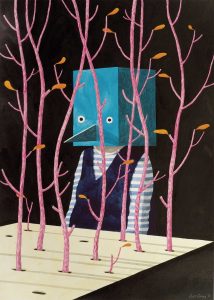





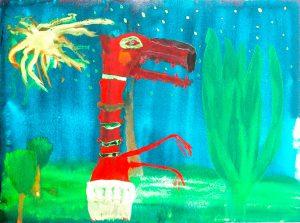
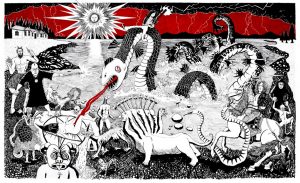

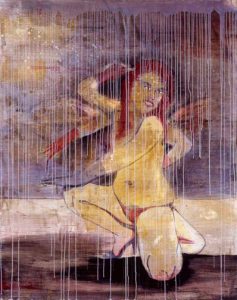


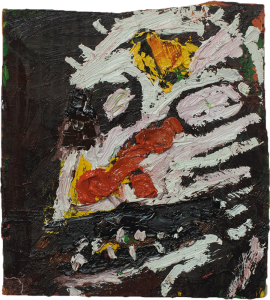
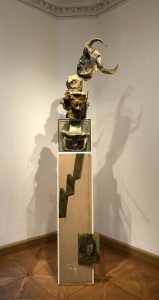

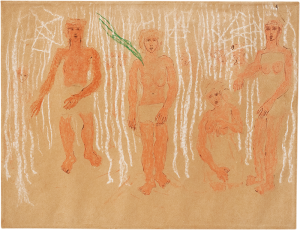
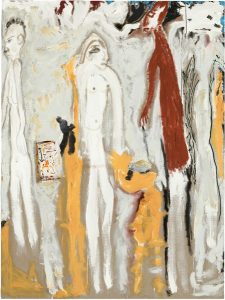
 +49 89 29 73 42
+49 89 29 73 42